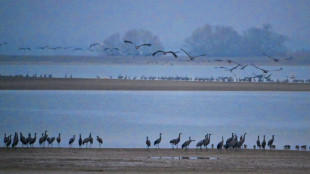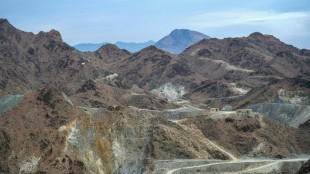
-
 Kim holds off No.1 Korda for wire-to-wire win in LPGA opener
Kim holds off No.1 Korda for wire-to-wire win in LPGA opener
-
Sundowns crush Arrows after title rivals Pirates edge Chiefs

-
 Georgia police arrest two opposition leaders at protest
Georgia police arrest two opposition leaders at protest
-
Spurs energised by getting 'help' out of slump - Postecoglou

-
 Rubio warns Panama of consequences over canal
Rubio warns Panama of consequences over canal
-
Mavs boss defends Doncic-Davis deal as trade stuns NBA

-
 Guardiola frustrated after 'fragile' Man City humbled by Arsenal
Guardiola frustrated after 'fragile' Man City humbled by Arsenal
-
De Vrij snatches last-gasp Milan derby draw for Inter

-
 Amorim concerned by 'serious' Martinez injury in latest Man Utd defeat
Amorim concerned by 'serious' Martinez injury in latest Man Utd defeat
-
Boniface helps dominant Leverkusen cut Bayern lead to six points

-
 Ireland's Prendergast says Crowley rivalry talk 'outside noise'
Ireland's Prendergast says Crowley rivalry talk 'outside noise'
-
Stones angered by 'unacceptable' Man City collapse

-
 'Dog Man' fetches top spot in N.America box office
'Dog Man' fetches top spot in N.America box office
-
'Failing marriage': Canadian border cities dismayed by US trade rift

-
 Boniface helps dominant Leverkusen cut Bayern lead back to six
Boniface helps dominant Leverkusen cut Bayern lead back to six
-
Arsenal thrash Man City to boost title challenge, Man Utd lose to Palace

-
 Five-star Arsenal crush woeful Man City to keep title bid alive
Five-star Arsenal crush woeful Man City to keep title bid alive
-
Mavs confirm Davis arrival as blockbuster Doncic deal shocks NBA

-
 At least 160,000 rally in Berlin against far right
At least 160,000 rally in Berlin against far right
-
Abhishek's brilliant ton helps India demolish England in final T20

-
 Canada's Auger-Aliassime battles to seventh ATP title
Canada's Auger-Aliassime battles to seventh ATP title
-
Abhishek ton helps India demolish England in final T20

-
 Uzun rescues draw for Frankfurt against Wolfsburg
Uzun rescues draw for Frankfurt against Wolfsburg
-
EU vows firm response if Trump unleashes tariffs

-
 Man Utd lose to Palace, Spurs ease pressure on Postecoglou
Man Utd lose to Palace, Spurs ease pressure on Postecoglou
-
Rubio meets Panama leader on Trump demands for canal

-
 Starmer hails 'real progress' on UK-Germany ties at Scholz talks
Starmer hails 'real progress' on UK-Germany ties at Scholz talks
-
Abhishek's 135 fires India to 247-9 in final T20 against England

-
 Trump says tariff 'pain' will be 'worth the price'
Trump says tariff 'pain' will be 'worth the price'
-
Lewandowski earns Barca win over Alaves to preserve title hopes

-
 Rybakina adds Sanguinetti to coaching staff
Rybakina adds Sanguinetti to coaching staff
-
England women's chief admits team out-played 'in every facet' after Ashes humiliation

-
 Global warming makes French reservoir a winter resort for migrating cranes
Global warming makes French reservoir a winter resort for migrating cranes
-
Kolo Muani double helps Juve to Empoli win, Inter set for key Milan derby

-
 Jones says Scotland must end Ireland losing streak to prove Six Nations worth
Jones says Scotland must end Ireland losing streak to prove Six Nations worth
-
Borthwick urges England to be a 'better team' against France in Six Nations

-
 Morata set for loan to Galatasaray from AC Milan
Morata set for loan to Galatasaray from AC Milan
-
Ajax loan English forward Chuba Akpom to Lille

-
 Man Utd sign Dorgu from Lecce
Man Utd sign Dorgu from Lecce
-
Netanyahu heads to US for pivotal Trump talks

-
 Fangio's Mercedes 1954 F1 car sold for record $53 mln at auction
Fangio's Mercedes 1954 F1 car sold for record $53 mln at auction
-
Residents near Japan sinkhole urged to evacuate

-
 China shrugs off new Trump tariffs but bruising trade war looms
China shrugs off new Trump tariffs but bruising trade war looms
-
Is it Beyonce's time? Music's A-listers ready for the Grammys

-
 Swiss champion Schmid wins Cadel Evans Road Race in scorching heat
Swiss champion Schmid wins Cadel Evans Road Race in scorching heat
-
Cash-keen Taliban betting on Afghanistan's mines

-
 Seeking light in dark times four years after Myanmar coup
Seeking light in dark times four years after Myanmar coup
-
Autos, electronics: What will Trump's tariffs impact?

-
 Three things we learned in the Six Nations
Three things we learned in the Six Nations
-
Russia and Ukraine trade blame for attack on Kursk school

| RIO | -0.83% | 60.41 | $ | |
| CMSC | -0.89% | 23.47 | $ | |
| NGG | -0.55% | 61.4 | $ | |
| RBGPF | 100% | 67.27 | $ | |
| BCC | -1.98% | 126.16 | $ | |
| SCS | -1.39% | 11.48 | $ | |
| BTI | -0.1% | 39.64 | $ | |
| CMSD | -1.59% | 23.84 | $ | |
| GSK | -0.26% | 35.27 | $ | |
| BP | -1.77% | 31.06 | $ | |
| JRI | -0.32% | 12.53 | $ | |
| RELX | -0.92% | 49.89 | $ | |
| BCE | -0.46% | 23.79 | $ | |
| RYCEF | -0.81% | 7.43 | $ | |
| AZN | -0.68% | 70.76 | $ | |
| VOD | -0.82% | 8.54 | $ |

Mozambique looks to revive gas deals stalled by unrest
Global energy giants were quick to halt their Mozambican gas projects when jihadist violence erupted on their doorsteps. After months of calm, reviving those multi-billion-dollar projects is a much slower job.
TotalEnergies CEO Patrick Pouyanne visited Maputo on Monday, saying he was optimistic about the $20-billion project.
"A lot of progress has been done, let me be clear," Pouyanne said, but added more work was needed to ensure lasting peace.
"Security is not only a matter of armed forces," he said. "It's also a question to work together with the population."
Vast natural gas deposits were discovered in the northern province of Cabo Delgado in 2010, the largest ever found south of the Sahara. Once tapped, Mozambique could become one of the world's 10 biggest exporters.
Since then, the Muslim-majority province has attracted three mega-projects: TotalEnergies' Mozambique LNG; ExxonMobile's Rovuma LNG; and ENI's Coral-Sul FLNG.
But in late 2017, armed insurgents began launching raids in the region, located near the Tanzanian border. Jihadists committed a series of beheadings and torched entire villages, claiming allegiance to the Islamic State.
Since then, 3,500 people have been killed, and 820,000 have fled their homes.
- Safety offshore -
Last March, insurgents made a surprise attack on the coastal town of Palma, the gas-hub near the TotalEnergies project, which the company promptly suspended.
"TotalEnergies should return this year, if it's going to meet its 2026 production goal," said Borges Nhamirre, a Maputo-based researcher for the Institute of Security Studies.
Of the three projects, only ENI's is on track. The Italian company's LNG facility is entirely offshore. ENI told AFP that it's set to begin production in the second half of 2022.
Coral Sul, the first floating LNG facility deployed in deep waters off Africa, arrived in Mozambique in early January. Once operational, it can produce 3.4 million tonnes of LNG a year.
With its 6.2-billion-euro investment, ENI said simply: "We continue to monitor security developments in the Cabo Delgado region and work closely with the government on this matter."
Experts say the offshore facility poses fewer security risks. Nhamirre pointed out that "in four years of violence, there hasn't been a single attack at sea, except for a few raids on fishermen near the coast."
The ExxonMobil project is at a standstill. Once expected to produce 15.2 million tonnes of LNG a year, the company doesn't seem ready to move ahead until the security improves.
- Future windfall -
"Maputo is determined to have this project," said Alexandre Raymakers, from the risk consultancy Verisk Maplecroft. "They need the revenue. We're talling about 35-60 billion dollars".
Mozambique's entire GDP is only $13 billion.
For the last six months, Mozambique's military has relied on 3,000 foreign troops sent by Rwanda and the Southern African Development Community (SADC) regional bloc.
The mission is officially open-ended, but Raymakers said "it's unlikely to last longer than 12 months due to SADC's limited ability to fund the mission."
"It's not about the number of troops they have on the ground," he said. "They have limited air cover, few helicopters."
And the insurgents have already adapated to the foreign forces, retreating to neighbouring Niassa province, which is now the rear base for their guerrilla attacks.
In January, the non-profit Acled documented about 30 attacks.
Mozambican President Filipe Nyusi claims progress in his anti-insurgent campaign.
But observers say the problem is more than military.
Cabo Delgado is about 2,000 kilometres (1,200 miles) north of Maputo, and is one of the poorest parts of a very poor country.
The lack of investment in infrastructure or opportunities for the youth make it easy for insurgents to find new followers.
O.Bulka--BTB
